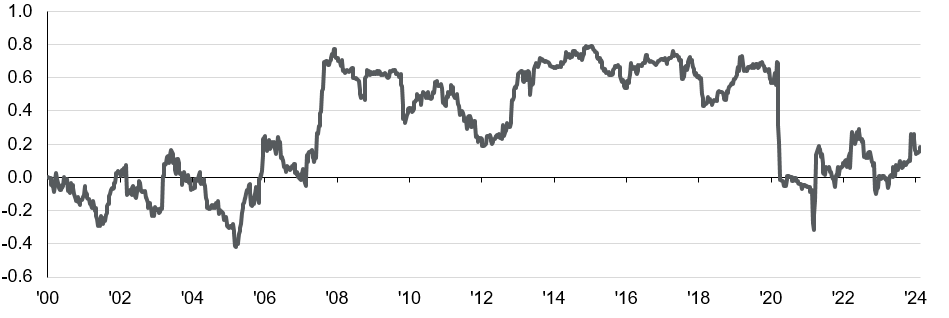
Japan’s corporate earnings are expected to expand by 10% in 2024, with forward P/E ratio at 15 times, which is in line with its 15-year average. This fits in with the broader Asia story of solid earnings growth with undemanding valuation.
In brief
- The Bank of Japan is preparing to depart from its negative interest rate policy, but its tightening path would be very gradual.
- While the Japanese yen is undervalued, neither interest rate differentials nor capital flows would prompt a sharp surge.
- The investment case for Japanese equities, from corporate governance reform, steady earnings performance and reasonable valuations, remain intact. The threat from monetary policy tightening or a stronger yen should be manageable.
The Bank of Japan (BoJ) is widely expected to depart from the Negative Interest Rate Policy (NIRP) in the months ahead as inflation takes hold. Many investors are questioning whether this shift in policy stance would support or hinder the bull run in Japanese equities, especially if the Japanese yen strengthens on the back of BoJ policy normalization.
A big step, a baby step
Having shifted to a negative policy rate in 2016 while adopting aggressive quantitative easing, the central bank has always been looking to bring inflation back towards its 2% target, with limited success. The global inflation surge of the past two years has raised Japan’s headline CPI inflation to 4.3% in March 2023. This has since eased back to 2.0% in January 2024. However, core inflation, excluding energy and fresh food prices, has been somewhat sticky, with month-over-month change stuck in the range of 0.2-0.3% during 2H 2023.
The BoJ is not quite ready to declare victory on shrugging off low inflation. Yet, in recent meetings it is increasingly open to discussing a departure from NIRP. The next event to watch out for would be the spring wage negotiation between the labor union and large companies and see whether last year’s strong wage growth can persist in 2024. Given a relatively benign corporate earnings outlook and a tight labor market, the central bank seems increasingly confident that wage growth should be strong enough to justify the start of rate increases.
That said, the BoJ’s decision making process is complicated by recent data. The Japanese economy recorded two consecutive quarters of quarter-over-quarter (q-o-q) contraction. In the final three months of 2023, the economy contracted by 0.1% q-o-q with private consumption and investment being pulled back. Meanwhile, Europe’s growth momentum is easing, and China’s recovery has been slow. BoJ officials would be mindful about tightening into weaker global growth. The central bank would also need to be watchful of the impact from rising Japanese government bond yields, and subsequent lower bond prices, on the balance sheets of domestic financial institutions and the influence of capital flows.
This is also partly why BoJ officials have reiterated that Japan’s monetary policy would remain accommodative even as they bring the policy rate back to positive. Raising rates could be a big step for the central bank from a historical perspective. Yet, the overall magnitude of change could be small. The overnight index swap (OIS) market shows investors are expecting policy rate to hit 0.25% by the end of 2024.
Exhibit 1: Correlation between the yen and the Japanese equity market
Rolling 1-year correlation between weekly movement in JPY per USD spot rate and the Nikkei 225 index
Source: FactSet, Nikkei, Reuters, J.P. Morgan Asset Management. Data is as of February 20, 2024.
Is a strong Japanese yen a done deal?
The general consensus is that the BoJ raising rates should push the Japanese Yen (JPY) stronger. It is true that the JPY is currently very cheap. It is two standard deviations below its 10-year average on a real effective exchange rate basis. However, given the policy outlook is already partly reflected by the OIS market for the U.S. Federal Reserve and the BoJ, we would need the Japanese central bank to be particularly hawkish, or the Fed to be more dovish, for the JPY to experience strong appreciation via narrower interest rate differentials between the two currencies.
Although it was suggested that the greater attention by foreign investors on Japanese equities leading to more inflows could be a source of currency strength, this was only part of the story. We have also seen a pick-up in capital outflows by Japanese investors into international equities. This was prompted by the revamped Nippon Individual Savings Account (NISA), a tax-free stock investment plan to unlock household savings. Japanese investors can invest in overseas markets, and there was a surge in overseas stock investment in early 2024. Hence, an inflow driven JPY strength is partly countered by domestic investors’ appetite for international assets.
Is Japanese Yen strength bad for equities?
Conventional wisdom point towards the yen and Japanese equities having a negative correlation. The argument goes that yen strength would be bad for equities, as it weakens Japanese exports’ competitive position, and undermines overseas earnings when translated back into yen. While we can’t deny the impact from foreign exchange on corporate performance, this correlation has weakened substantially compared to the past.
As Exhibit 1 illustrates, the negative correlation between JPY and the Nikkei 225 index was strong between 2007 and 2019. This relationship weakened considerably during the pandemic. Even though this has picked up in recent quarters, it is still considerably weaker than the 2007-2019 era. Hence, even in the case of JPY strength, we may not get the historical reaction of weaker equity performance.
Investment implications
Having assessed the outlook of BoJ policy (tightening with caution) and the possible implications on the JPY (modest JPY strength and not necessarily negative for equities), it is worth recapping some of the positive fundamentals facing Japanese equities.
A cornerstone in supporting Japanese equities is the ongoing improvement in corporate governance. The Tokyo Stock Exchange (TSE) announced on January 15 by disclosing the status of individual companies’ responses to its request for corporate value enhancement measures. This reflects the TSE’s ongoing progress in reforming Japanese corporate behavior. The percentage of listed companies (Prime and Standard) trading below book value has declined to 47% from 54% at the start of 2023. The total amount of buybacks announced by Japanese companies so far in FY2023 is already above FY2022’s record high. The next phase of reform in boosting corporate return on equity is arguably more challenging, but at least a growing share of senior management are placing shareholders at a higher priority.
Meanwhile, Japan’s corporate earnings (MSCI Japan) are expected to expand by 10% in 2024, with forward price-to-earnings ratio at 15 times, which is in line with its 15-year average. This fits in with the broader Asia story of solid earnings growth with undemanding valuation. The more expensive sectors in Japan, such as consumer discretionary, health care and technology are experiencing earnings upgrade. Following a value rally in 2023, investors’ attention could broaden to include some of the more competitive growth companies in the market. As investors question the concentration risk of U.S. tech companies driving market rally, Japan provides a good source of diversification in developed market equities.
